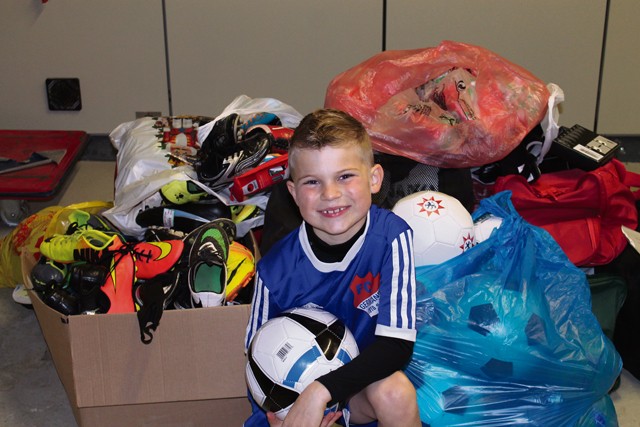
Brayden Tester, son of Chief Master Sgt. David Tester, U.S. Air Forces in Europe operations superintendent, poses in front of soccer equipment on Ramstein. Brayden gathered support from around the KMC to collect soccer equipment for Ethiopian children that his father told him “couldn’t afford shoes to play in or soccer balls to play with.”
How could someone play soccer without shoes? Why would somebody choose to play soccer without a soccer ball? These questions were spinning around a 9-year-old boy’s head.
His father, Chief Master Sgt. David Tester, U.S. Air Forces in Europe operations superintendent, had just returned from a deployment to Ethiopia. While there, he witnessed kids that were playing without safety gear and kicking around make-shift soccer balls of bundled metal. While trying to explain this to his son Brayden, he noticed the puzzled look in his eyes.
That puzzled look quickly turned to one of disbelief when Tester mentioned one specific moment he witnessed.
“My dad told me this story about how this kid, who tried to kick a can around with his friends, sliced his foot open,” Brayden said.
After hearing this, Brayden immediately wanted to help. His first idea, although very generous, wasn’t very practical, according to his father.
“The first thing he wanted to do was take all the money in his bank account and buy them equipment,” Tester said.
In light of saving his son’s bank account, Tester brainstormed a more realistic way to help: a donation drive of soccer equipment. It was a foundation that Brayden quickly jumped on and took off from there.
Brayden gathered support from around the KMC to collect soccer gear for the Ethiopian children.
Brayden’s mother, Sabrina, said the urge he had to help the Ethiopian children spurred him to make the drive happen.
“It was immediately after David told Brayden about the kids that he made posters about the drive and hung them everywhere throughout the school,” Sabrina said. “He wanted to help them so badly.”
Brayden was able to do this by working with his principal at the time, Joshua Adams, now the Ramstein Middle School principal, throughout the duration of the drive.
According to Sabrina, it was an astounding success. Brayden was able to gather hundreds of soccer jerseys, cleats, balls, shin guards and goalkeeper equipment donations.
Once the Testers boxed all the donated equipment, they bundled it all up and shipped it 6,500 miles south to the town of Arba Minch, Ethiopia.
Airmen from 1st Combat Communications Squadron were anxious to gift the boxes to those less fortunate around them.
Just returning from their own deployments to Ethiopia, some of Tester’s coworkers were able to see the impact Brayden made firsthand every day. Kids were playing soccer with real soccer cleats and had real soccer balls and jerseys.
“You could see the smiles on their faces, and you could feel the appreciation they had as we fitted them with shoes, cleats and soccer jerseys,” said Tech. Sgt. Adam Stewart, 1st CBCS tactical network operations supervisor. “In a way, you could say that Brayden’s actions directly motivated our teammates to do their part.”
It wasn’t just the lives of the Ethiopian children Brayden affected, but also those who worked alongside him, including Stewart.
“The measure of compassion it took to drive him to want to help a group of children, who he doesn’t even know, is amazing,” Stewart said.
In the end, Brayden was given answers to those questions circling in his head. His passion for soccer and people drove him to do extraordinary things, and that, according to his parents, is what makes him so strong.


